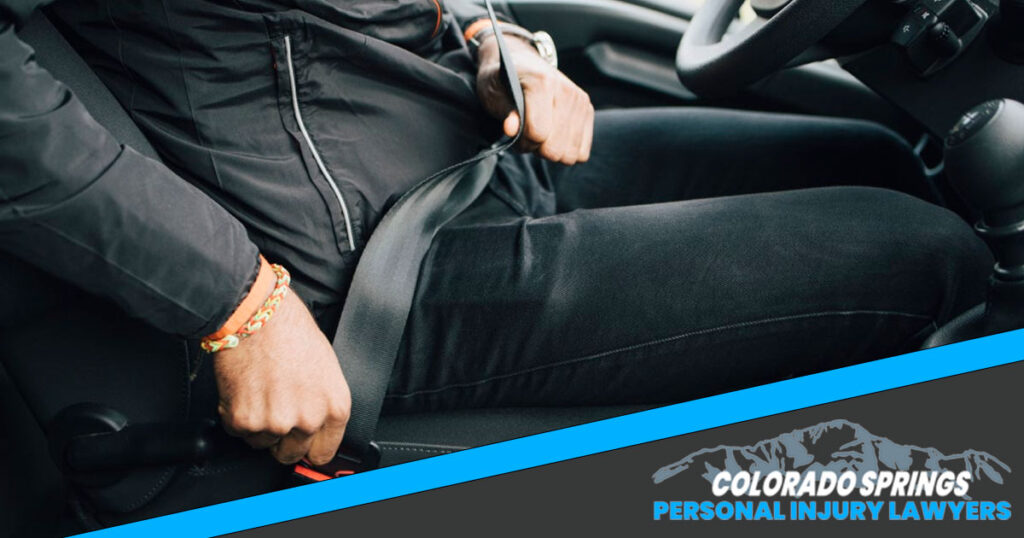Even though wearing a seat belt is crucial for staying safe during an accident, does it play a role in deciding who’s at fault and how much compensation you get after a crash? When everything settles down and the legal stuff kicks in, does wearing a seat belt matter in deciding who pays for the damage and injuries in a personal injury case following an accident in Colorado Springs? The connection between safety rules and legal consequences raises tricky questions that dig into the details of car laws and civil court proceedings.
Is It Illegal To Not Wear A Seat Belt In Colorado Springs?
In Colorado Springs, wearing a seat belt is more than just a safety precaution; it’s the law. Not buckling up can result in fines and penalties, as Colorado law mandates seat belt usage for all drivers and passengers in vehicles. This law applies to both local roads and highways, emphasizing the importance of seat belt compliance to ensure the safety of everyone on the road.
The Effectiveness of Seat Belts in Car Crashes
Several factors come into play when determining the effectiveness of seat belts in car crashes. One key factor is the speed at which the crash occurs. The force of impact in high-speed collisions can significantly impact the ability of seat belts to prevent injuries. Additionally, the type of vehicle involved in the crash plays a crucial role. Different vehicles have varying safety features and structural designs that can influence how well seat belts work to protect occupants during an accident. Understanding these factors is essential for promoting safer driving practices and enhancing overall road safety.
Statistics on Seat Belt Efficacy in Car Accidents
Statistics on the effectiveness of seat belt usage in car accidents in Colorado Springs highlight a critical point – wearing seat belts saves lives. In 2022, a total of 763 people tragically lost their lives on Colorado roads, marking it as one of the deadliest periods in the state’s records. Out of these tragic deaths, it was reported that 236 individuals had failed to use their seat belts during the accidents. Research conducted on national road safety has indicated a significant decrease in severe injuries and deaths in car crashes when seat belts are utilized. These findings highlight the critical significance of fastening seat belts as an uncomplicated yet powerful method to boost road safety and safeguard individuals during unexpected collisions.
The National Highway Traffic Safety Administration (NHTSA) has suggested that the utilization of lap and shoulder seat belts can potentially lower the likelihood of:
1. Reducing front seat passenger car fatalities by 45%
2. Decreasing front seat passenger car injuries by 50%
3. Lowering front seat light truck fatalities by 60%
4. Diminishing front seat light truck injuries by 65%
How Not Using A Seat Belt Affects Injuries In Crashes
Though seat belts may result in minor injuries such as bruising during a collision, the consequences of not using one can be far more severe. Accidents where seat belts are not worn often lead to a broader spectrum of serious injuries, including abdominal, skeletal, vascular, and thoracic trauma like whiplash, concussions, fractures, musculoskeletal damage, and internal bleeding. These injuries can have lasting effects, impacting individuals for an extended period following the crash.
Surviving a car accident can cause emotional turmoil and disrupt an individual’s overall well-being. Issues like post-traumatic stress disorder (PTSD), anxiety, depression, and personality changes due to traumatic brain injury are prevalent outcomes of car crashes. Some injuries may never fully recover, resulting in lifelong discomfort or functional impairments, while even treatable injuries can give rise to substantial medical costs.
The Top Ten Injuries In Crashes When Not Wearing A Seat Belt
1. Head and brain injuries, including concussions, traumatic brain injuries (TBIs), and skull fractures.
2. Facial injuries, such as lacerations, fractures, and dental damage.
3. Neck and spinal cord injuries, like whiplash, herniated discs, and spinal cord damage.
4. Chest injuries, such as rib fractures, collapsed lungs, and cardiac contusions.
5. Abdominal injuries, including internal bleeding, organ damage, and seat belt syndrome.
6. Pelvic injuries in the form of fractures and pelvic instability.
7. Broken bones, sprains, and nerve damage in arms or legs.
8. Soft tissue damage, such as bruises, muscle strains, and ligament tears.
9. Internal injuries, like damage to internal organs such as the liver, spleen, or kidneys.
10. Post-traumatic stress disorder (PTSD) or emotional trauma resulting from the crash.
Debunking Common Myths Related to Seat Belt Usage
Dispelling misconceptions surrounding seat belt usage is crucial for promoting road safety and saving lives. By addressing common myths about seat belt effectiveness, we can emphasize the proven benefits of wearing seat belts and encourage responsible behavior among drivers and passengers. Understanding the truth behind these myths is essential in fostering a culture of safety on the roads and preventing avoidable injuries in the event of accidents.
Myths surrounding seat belt usage include:
1. “I’m a safe driver, so I don’t need to wear a seat belt.”
2. “Seat belts can cause more harm than good in a crash.”
3. “It’s better to be thrown clear of the vehicle during an accident.”
4. “I’m just driving a short distance, so I don’t need to buckle up.”
5. “Only the driver needs to wear a seat belt, passengers are safe without one.”
6. “Seat belts are unnecessary in the backseat.”
Legal Implications of Not Wearing a Seat Belt in Colorado Springs
In Colorado Springs, the consequences of not wearing a seat belt extend beyond safety concerns to legal ramifications. Failure to buckle up can result in fines and penalties under state law. These fines hope to prevent more serious injuries by serving as a reminder of the importance of adhering to seat belt regulations to promote road safety.
Can Not Wearing A Seat Belt Affect My Personal Injury Claim In Colorado Springs?
Not wearing a seat belt can potentially impact your personal injury claim if you don’t have an experienced Colorado Springs car accident attorney on your side. Failure to use a seat belt may be considered negligence, which could affect your claim for compensation in the event of an accident. Colorado is one of the 15 states that have laws in effect that might lead to a decrease in the damages awarded to the plaintiff if they were not wearing a seat belt during the accident.
This means that insurance companies and legal proceedings may take into account your decision not to wear a seat belt. When looking at liability, your failure to wear a seat belt could be viewed as contributing to the severity of your injuries. This may potentially reduce the amount of compensation you are entitled to receive.
Demonstrating that you were not at fault for the accident and that your injuries would have been sustained regardless of seat belt use can be a challenging legal hurdle to overcome without a Colorado Springs car accident attorney. Having proper legal representation plus the solid evidence they will provide can make all the difference.
The Top Ten Ways A Colorado Springs Car Accident Attorney Can Help Your Case
1. Legal Expertise: A Colorado Springs car accident attorney brings specialized legal knowledge and experience to handle your case effectively.
2. Investigation Support: They can conduct thorough investigations to gather evidence, assess liability, and strengthen your claim.
3. Negotiation Skills: An attorney can skillfully negotiate with insurance companies and other parties to secure a fair settlement.
4. Understanding of State Laws: They have in-depth knowledge of Colorado laws and regulations related to car accidents, ensuring your rights are protected.
5. Case Preparation: From filing paperwork to preparing documents and evidence, an attorney ensures your case is meticulously organized and presented.
6. Medical Referrals: They can connect you with trusted medical professionals to assess and document your injuries for your case.
7. Court Representation: If needed, an attorney can represent you in court, advocating for your best interests during trial proceedings.
8. Damage Assessment: They can help calculate the full extent of your damages, including medical expenses, lost wages, pain and suffering, and more.
9. Timely Resolution: An attorney can expedite the claims process, working efficiently to achieve a timely resolution for your case.
10. Peace of Mind: By handling all legal aspects of your case, a Colorado Springs car accident attorney provides you with peace of mind, knowing that your rights are being protected and advocated for diligently.
Contact A Colorado Springs Car Accident Attorney For A Free Consultation Today
If you’ve been in an accident where not using a seat belt was a factor, don’t go through it alone. Seek justice and explore your options with a trusted Colorado Springs car accident attorney. Contact us today for a free consultation to understand your rights and pursue the settlement you deserve. Your compensation matters — let us help you seek the legal actions you need to move forward confidently.

















